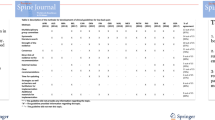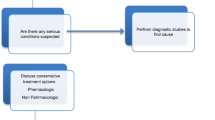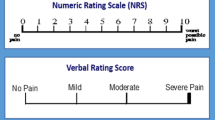Abstract
Purpose
Over 20 years ago the term non-specific low back pain became popular to convey the limitations of our knowledge of the pathological source of most people’s low back pain. Knowledge of underlying pathology has advanced little since then, despite limited improvements in outcomes for patients with low back pain.
Methods
This paper discusses potential misunderstandings related to diagnostic studies in the field of low back pain and argues that future diagnostic studies should include and investigate pathological sources of low back pain.
Results
Six potential misunderstandings are discussed. (1) Until diagnosis is shown to improve outcomes it is not worth investigating; (2) without a gold standard it is not possible to investigate diagnosis of low back pain; (3) the presence of pathology in some people without low back pain means it is not important; (4) dismissal of the ability to diagnose low back pain in clinical guidelines is supported by the same level of evidence as recommendations for therapy; (5) suggesting use of a diagnostic test in research is misinterpreted as endorsing its use in current clinical practice; (6) we seem to have forgotten the ‘bio’ in biopsychosocial low back pain.
Conclusions
We believe the misunderstandings presented in this paper partly explain the lack of investigation into pathology as an important component of the low back pain experience. A better understanding of the biological component of low back pain in relation, and in addition, to psychosocial factors is important for a more rational approach to management of low back pain.
Similar content being viewed by others
References
Mixter WJ, Barr JS (1934) Rupture of the intervertebral disc with involvement of the spinal canal. N Engl J Med 211:210–214
Waddell G (1987) 1987 Volvo award in clinical sciences. A new clinical model for the treatment of low-back pain. Spine 12:632–644
Anonymous (1987) Scientific approach to the assessment and management of activity-related spinal disorders. A monograph for clinicians. Report of the Quebec Task Force on Spinal Disorders. Spine 12:S1–59
Koes BW, van Tulder MW, Ostelo R, Kim Burton A, Waddell G (2001) Clinical guidelines for the management of low back pain in primary care: an international comparison. Spine 26:2504–2513
Deyo RA (2004) Treatments for back pain: can we get past trivial effects? Ann Intern Med 141:957–958
Machado LA, Kamper SJ, Herbert RD, Maher CG, McAuley JH (2009) Analgesic effects of treatments for non-specific low back pain: a meta-analysis of placebo-controlled randomized trials. Rheumatology (Oxford) 48:520–527
Deyo RA, Weinstein JN (2001) Low back pain. N Engl J Med 344:363–370
Bogduk N (2005) Low back pain. In: Clinical anatomy of the lumbar spine and sacrum. Elsevier, Sydney, pp. 183–216
Chou R, Qaseem A, Snow V, Casey D, Cross JT Jr, Shekelle P, Owens DK (2007) Diagnosis and treatment of low back pain: a joint clinical practice guideline from the American College of Physicians and the American Pain Society. Ann Intern Med 147:478–491
Carragee EJ, Lincoln T, Parmar VS, Alamin T (2006) A gold standard evaluation of the “discogenic pain” diagnosis as determined by provocative discography. Spine 31:2115–2123
Peng B, Pang X, Wu Y, Zhao C, Song X (2010) A randomized placebo-controlled trial of intradiscal methylene blue injection for the treatment of chronic discogenic low back pain. Pain 149:124–129
Marshall BJ (1983) Unidentified curved bacilli on gastric epithelium in active chronic gastritis. Lancet 1:1273–1275
Rutjes AW, Reitsma JB, Coomarasamy A, Khan KS, Bossuyt PM (2007) Evaluation of diagnostic tests when there is no gold standard. A review of methods. Health Technol Assess 11(50):iii, ix-51
Boden SD, Davis DO, Dina TS, Patronas NJ, Wiesel SW (1990) Abnormal magnetic-resonance scans of the lumbar spine in asymptomatic subjects. A prospective investigation. J Bone Joint Surg Am 72:403–408
Jarvik JJ, Hollingworth W, Heagerty P, Haynor DR, Deyo RA (2001) The longitudinal assessment of imaging and disability of the back (laidback) study: baseline data. Spine 26:1158–1166
Jensen MC, Brant-Zawadzki MN, Obuchowski N, Modic MT, Malkasian D, Ross JS (1994) Magnetic resonance imaging of the lumbar spine in people without back pain. N Engl J Med 331:69–73
Duncan R, Peat G, Thomas E, Hay E, McCall I, Croft P (2007) Symptoms and radiographic osteoarthritis: not as discordant as they are made out to be? Ann Rheum Dis 66:86–91
Cheung KM, Karppinen J, Chan D, Ho DW, Song YQ, Sham P, Cheah KS, Leong JC, Luk KD (2009) Prevalence and pattern of lumbar magnetic resonance imaging changes in a population study of one thousand forty-three individuals. Spine 34:934–940
de Schepper EI, Damen J, van Meurs JB, Ginai AZ, Popham M, Hofman A, Koes BW, Bierma-Zeinstra SM (2010) The association between lumbar disc degeneration and low back pain: the influence of age, gender, and individual radiographic features. Spine 35:531–536
Jensen TS, Karppinen J, Sorensen JS, Niinimaki J, Leboeuf-Yde C (2008) Vertebral endplate signal changes (Modic change): a systematic literature review of prevalence and association with non-specific low back pain. Eur Spine J 17:1407–1422
van Tulder M, Becker A, Bekkering T, Breen A, del Real MTG, Hutchinson A, Koes B, Laerum E, Malmivaara A, On behalf of the Cost B. Working Group on Guidelines for the Management of Acute Low Back Pain in Primary Care (2006) Chapter 3. European guidelines for the management of acute nonspecific low back pain in primary care. Eur Spine J 15(Suppl 2):S169–S191
Stanton TR, Henschke N, Maher CG, Refshauge KM, Latimer J, McAuley JH (2008) After an episode of acute low back pain, recurrence is unpredictable and not as common as previously thought. Spine 33:2923–2928
Hayden JA, Chou R, Hogg-Johnson S, Bombardier C (2009) Systematic reviews of low back pain prognosis had variable methods and results: guidance for future prognosis reviews. J Clin Epidemiol 62:781–796
Kent PM, Keating JL, Kent PM, Keating JL (2008) Can we predict poor recovery from recent-onset nonspecific low back pain? A systematic review. Manual Ther 13:12–28
Henschke N, Maher CG, Refshauge KM, Das A, McAuley JH (2007) Low back pain research priorities: a survey of primary care practitioners. BMC Fam Pract 8:40
Beattie PF, Arnot CF, Donley JW, Noda H, Bailey L (2010) The immediate reduction in low back pain intensity following lumbar joint mobilization and prone press-ups is associated with increased diffusion of water in the L5–S1 intervertebral disc. J Orthop Sports Phys Ther 40:256–264
Hides JA, Jull GA, Richardson CA (2001) Long-term effects of specific stabilizing exercises for first-episode low back pain. Spine 26:E243–E248
Acknowledgments
The authors thank Michele Battié for her constructive comments during manuscript preparation.
Conflict of interest
None.
Author information
Authors and Affiliations
Corresponding author
Rights and permissions
About this article
Cite this article
Hancock, M.J., Maher, C.G., Laslett, M. et al. Discussion paper: what happened to the ‘bio’ in the bio-psycho-social model of low back pain?. Eur Spine J 20, 2105–2110 (2011). https://doi.org/10.1007/s00586-011-1886-3
Received:
Revised:
Accepted:
Published:
Issue Date:
DOI: https://doi.org/10.1007/s00586-011-1886-3




